A MOTHER is calling for young women to be given smear tests after they’ve had children.
Natassja Hall, 24, wants urgent changes to a screening programme which risks young women’s lives.
Her call comes after her own battle – last year she was told she had “severe cancerous cells.”
She’s just been given the all clear but faces tests every six months.
And her plea came on the day it was revealed that there has been a 19% annual rise in the number of women diagnosed with serious cell changes that could develop into cervical cancer.
Natassja, from Almondbury, said: “It seems to make so much sense but those in positions of power to be able to do something aren’t listening.
“Even if women who had children were offered smear tests it would be a step forward.”
Currently regular testing starts at 25, even if younger the women have had children.
Natassja is a mother-of-two and it was after she had her son she began to feel pain. She insisted on having a smear test and that’s how her cancerous cells were discovered.
She has now launched a petition calling for the age for cervical screening to be lowered and wants the people of Huddersfield to back her.
Health experts believe the death of TV star Jade Goody in 2009 has fuelled a rise in the number of young women in England getting checked out for the disease.
Figures from the Office for National Statistics (ONS) show the biggest increase in diagnosis for serious cell changes between 2008 and 2009 was among young women aged 15 to 19, and those aged 25 to 29.
Women under 25 are not currently included in the NHS cancer screening programme for England, despite screening being offered to the under-25s in Scotland and Wales.
Jessica Harris, senior health information officer at Cancer Research UK, said: “A slightly higher number of women went for cervical screening in 2009, which could help to explain why more women have been diagnosed with severe changes that could develop into cancer.
“When the pre-cancerous changes are diagnosed, they are treated, which can then prevent cervical cancer from developing.
“Cancer Research UK encourages women to take up their screening invitations when they receive them.”
Meanwhile, Natassja faces another scan in August and then every six months thereafter.
But she also wants to use her experience to highlight the issue among other women, especially young mothers.
To support her cause visit:
www.ipetitions.com/petition/lowertheageforcervicalcancertest
ABOUT 1,000 women die of cervical cancer in the UK every year.
Experts estimate screening saves at least 4,500 lives a year in England alone.
The ONS figures show a 19.2% increase in cases of carcinoma in situ of the cervix for women of all ages.
This means the full thickness of the surface layer of the cervix is affected by serious cell changes, requiring prompt treatment.
In 2009 there were 27,438 cases of carcinoma in situ and a rate of 110.3 women per 100,000 population. This compares with 23,023 cases and a rate of 92.5 females per 100,000 population in the previous year.
The ONS data also revealed there were 134,636 new cases of cancer registered for men in England in 2009, up 6,533 (5.1%) on the previous year.
There were 130,043 new cases for women, up 3,337 (2.6%).
For men, the three most common cancers were prostate, lung and bowel cancer, and breast, lung and
















